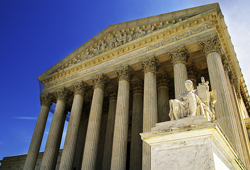 On December 5, 2017, the Federal Circuit heard oral argument in Momenta Pharmaceuticals, Inc. v. Bristol-Myers Squibb Company, 17-1694. Momenta is appealing a PTAB decision upholding the validity of BMS’s U.S. Patent No. 8,476,239 (“the ’239 patent”) which covers BMS’s Orencia® product. One of the issues raised in the appeal is whether Momenta, who has not yet filed an aBLA and is admittedly years away from any such submission, has standing to appeal from the PTAB’s decision upholding the validity of the ’239 patent.
On December 5, 2017, the Federal Circuit heard oral argument in Momenta Pharmaceuticals, Inc. v. Bristol-Myers Squibb Company, 17-1694. Momenta is appealing a PTAB decision upholding the validity of BMS’s U.S. Patent No. 8,476,239 (“the ’239 patent”) which covers BMS’s Orencia® product. One of the issues raised in the appeal is whether Momenta, who has not yet filed an aBLA and is admittedly years away from any such submission, has standing to appeal from the PTAB’s decision upholding the validity of the ’239 patent.
BMS has argued that the Federal Circuit should dismiss Momenta’s appeal for lack of standing because Momenta does not market a product within the purview of the patent claims and is years away from filing an FDA application to market any such product. As a result, BMS argued, Momenta cannot show that it has suffered a concrete and particularized injury necessary for Article III standing. In response, Momenta has argued that allowing the Board’s decision to stand causes it concrete harm. Momenta asserted that it is at a “fork in the road” in the development of its product and, if it cannot appeal the PTAB decision, it would incur costs associated with changing the direction of its R&D efforts. Momenta further argued that the IPR estoppel provision converts any future injury into a present injury-in-fact sufficient to provide Article III standing. Because 35 U.S.C. § 315(e) prohibits an IPR petitioner from asserting that a patent “claim is invalid on any ground that the petitioner raised or reasonably could have raised during that inter partes review,” if Momenta cannot appeal the patentability of the claims on the grounds raised in the IPR, it will forever lose its ability to do so.
Momenta argued that, in the event the Federal Circuit concludes that Momenta lacks standing to appeal, the Court should vacate the PTAB’s decision upholding the validity of the patent so that Momenta could refile its challenge in the future when it has standing to appeal an adverse decision. BMS responded to that argument by making the point that vacating the PTAB’s decision would provide Momenta a “second bite at the apple” to challenge the validity of the patent, and that BMS should not be required to defend its patent against multiple attacks due to Momenta having prematurely filed its IPR before filing its FDA application.
The audio of the oral argument can be found here. The parties’ briefs can be found here: Momenta Opening Brief, BMS Responsive Brief, Momenta Reply Brief.
